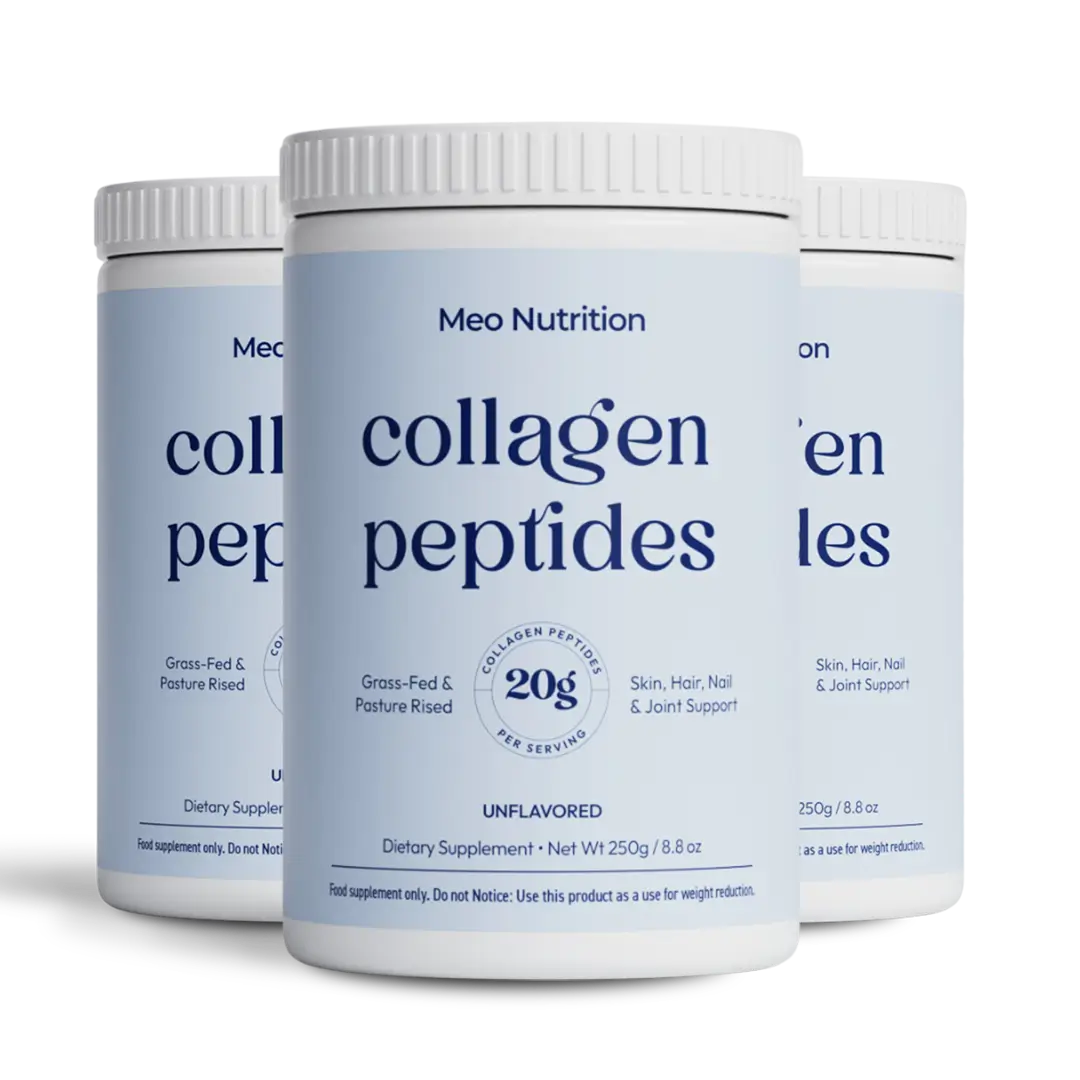Collagen is an essential structural protein in the human body. It forms the structural foundation of skin, bones, joints, and connective tissues. As we age, we can suffer from decreased collagen production, leading to visible signs of aging like wrinkles and joint discomfort.
To overcome this natural deficiency, many people choose to take collagen supplements. The two most popular sources of collagen supplements are bovine, derived from cows, and marine, which comes from the skin of the fish). The Alpha Lipoic Acid (ALA) complements both types of collagen supplements by protecting against oxidative damage, enhancing absorption, and supporting overall skin and joint health.
You may be wondering, which collagen should I choose in the bovine collagen vs. marine collagen comparison? How do I know which one is the best fit for your health needs? In this extensive guide, we’ll explore what is the difference between collagen and marine collagen, its benefits, and key uses. The goal is for you to take an informed decision, taking into account all variables.
What Is Bovine Collagen?
Bovine collagen comes from the hides, bones, and connective tissues of cows. It is one of the most frequent and universally available collagen supplements on the market. Bovine collagen is rich in Type I and Type III collagen.
Type I collagen helps to maintain skin elasticity and hydration, which reduces the appearance of wrinkles. On the other hand, Type III helps to support the structural integrity of connective tissues, including muscles and joints. As a result, bovine collagen is often chosen for its wide benefits for skin, bone health, and overall joint mobility.
This means that bovine collagen is important because it supports skin health, joint function, and muscle recovery.
What Is Marine Collagen?
Marine collagen comes from fish skin and scales. Compared to bovine collagen, marine collagen is considered more eco-friendly due to its sourcing from fish byproducts, which are often considered waste in the seafood industry. This makes marine collagen a great option for those who want a more sustainable supplement choice.
When it comes to its composition, marine collagen is predominantly Type I collagen, the most abundant and common type found in the human body. This is a key factor in the effectiveness of marine collagen in supporting various health aspects, particularly skin health, joint function, and overall tissue regeneration.
But, is marine collagen better than bovine? Many people find that marine collagen is more bioavailable, meaning it is easier for the body to absorb and utilize, which can result in faster and more noticeable benefits. Also, studies suggest that marine collagen can benefit metabolic health by improving the body's collagen production, while also reducing signs of aging.
When comparing marine vs. bovine collagen, marine collagen has a superior absorption and a higher concentration of Type I collagen making it a preferred option for people focused on skin, joint, and metabolic health.

The Key Benefits of Bovine Collagen
These are some of the main health benefits of bovine collagen
-
Promotes Joint Health – Type III collagen is important for maintaining cartilage integrity, reducing stiffness, and improving mobility. Because of this, individuals experiencing joint pain or arthritis choose this kind of supplement.
-
Improves Skin Elasticity – Bovine collagen helps restore collagen stores in the skin. This smooths wrinkles and fine lines for firmer and more youthful-looking skin.
-
Improves Sleep and Relaxation – Bovine collagen is naturally rich in glycine, an amino acid that helps to improve sleep quality and relaxation.
-
Supports Muscle Recovery and Growth – Because it supports connective tissue, bovine collagen supplements are a highly recommended supplement for athletes and active individuals looking to improve muscle recovery and overall performance.
-
Strengthens Hair and Nails – The amino acids in bovine collagen are key to promoting healthier and stronger hair and nails while reducing brittleness and breakage.
-
Promotes Gut Health – Bovine collagen contains glycine, which is key for protecting and healing the gut lining. This makes it a useful supplement for those dealing with digestive issues, such as leaky gut syndrome, for example.
-
Promotes Heart Health– Type I and Type III collagen is key to maintaining the health of blood vessels. It supports the structural integrity of arteries, reducing the risk of vascular issues. This can contribute to overall heart health by supporting circulation and reducing arterial stiffness. This contributes to avoiding cardiovascular disease.
The Key Benefits of Marine Collagen
To expand the comparison of marine collagen vs bovine, here are some key health benefits that marine collagen content offers.
-
Promotes Hair Growth and Strength – The abundance of Type I collagen in marine collagen is what makes it particularly positive for hair follicles, supporting growth, strength, and shine.
-
Superior Absorption – Marine collagen peptides' sizes are smaller, making them easier to digest and more efficiently absorbed by the body.
-
Blood-Brain Barrier – Collagen is a key component building block of blood vessels, including those in the blood-brain barrier. Maintaining the integrity of this barrier is essential for brain health for its protection from toxins and supporting nutrient delivery.
-
Boosts Bone Density and Strength: Research shows that marine collagen can contribute to enhancing bone mineral density. This makes it a valuable supplement for those focused on bone health.
-
Eco-Friendly and Pescatarian-Friendly – Marine collagen is typically derived from fish byproducts, offering a more eco-friendly alternative to bovine collagen supplements. It is also ideal for individuals who follow a pescatarian diet. Is marine collagen better than bovine collagen? In terms of sustainability, marine collagen is better.
-
Improves Skin Hydration – Marine collagen is recognized for boosting skin hydration, minimizing dryness, and skin a smoother, more youthful glow, combating skin aging. If you blend it with CoQ10, this effect can be improved, as CoQ10 supports collagen synthesis and helps protect the skin from oxidative damage.

When paired with CoQ10 vs Ubiquinol, the difference in their effectiveness becomes clear. CoQ10 helps protect the skin from oxidative damage and supports collagen synthesis, both of which are essential for maintaining the integrity of marine collagen. Marine collagen, with its high concentration of Type I collagen, is particularly effective for improving skin hydration and elasticity. When combined with CoQ10, it helps protect the skin from environmental damage while maximizing the production of collagen, boosting overall benefits of the supplement.
On the other hand, Ubiquinol, the active form of CoQ10, is more easily absorbed by the body, giving a more immediate and strong antioxidant protection for the skin. This means that when you combine Ubiquinol with marine collagen, your body can more effectively utilize both ingredients, leading to quicker, more noticeable improvements in skin hydration, smoothness, and collagen production.
Marine collagen is highly sought after for its beauty-enhancing benefits and high bioavailability. It is especially effective for individuals looking to improve skin hydration, hair growth, and overall anti-aging support.
Making the Right Choice for Your Health Goals
When deciding which is better, bovine or marine collagen, consider your health priorities and lifestyle factors:
-
For Joint and Muscle Support: Bovine collagen is ideal due to its combination of Type I and III collagen, both of which are essential to maintain cartilage and muscle strength. It usually benefits men's health, as it helps with joint flexibility, reduces inflammation, and supports muscle recovery after intense physical activity.
-
For Skin, Hair, and Nail Health: Marine collagen comes across as the best option because it offers superior hydration and absorption, which improves skin elasticity, supporting stronger hair and nails.
-
For Digestive Health: Bovine collagen is rich in glycine, an important amino acid that assists in gut repair and overall digestive function.
-
For Sustainability and Dietary Preferences: Marine collagen is a more eco-friendly option, which makes it suitable for pescatarians. Contrarily, Bovine collagen is not.
When comparing bovine collagen versus marine collagen supplements, make sure to first consider your specific health needs and prioritize the best option.
Conclusion
Both bovine and marine collagen supplements offer exceptional benefits. But as it happens with all supplements, the choice depends on your specific health needs. Consume bovine collagen is best for joint and muscle support, while marine collagen is superior for skin hydration and absorption efficiency. Regardless of your choice, incorporating collagen into your routine can contribute to overall health, improve skin, joints, and overall vitality.
If you're looking to significantly improve your skin’s radiance, support joint function, or improve your recovery after exercise, choosing the right collagen supplement, marine collagen or bovine, can help you achieve your health goals effectively.

